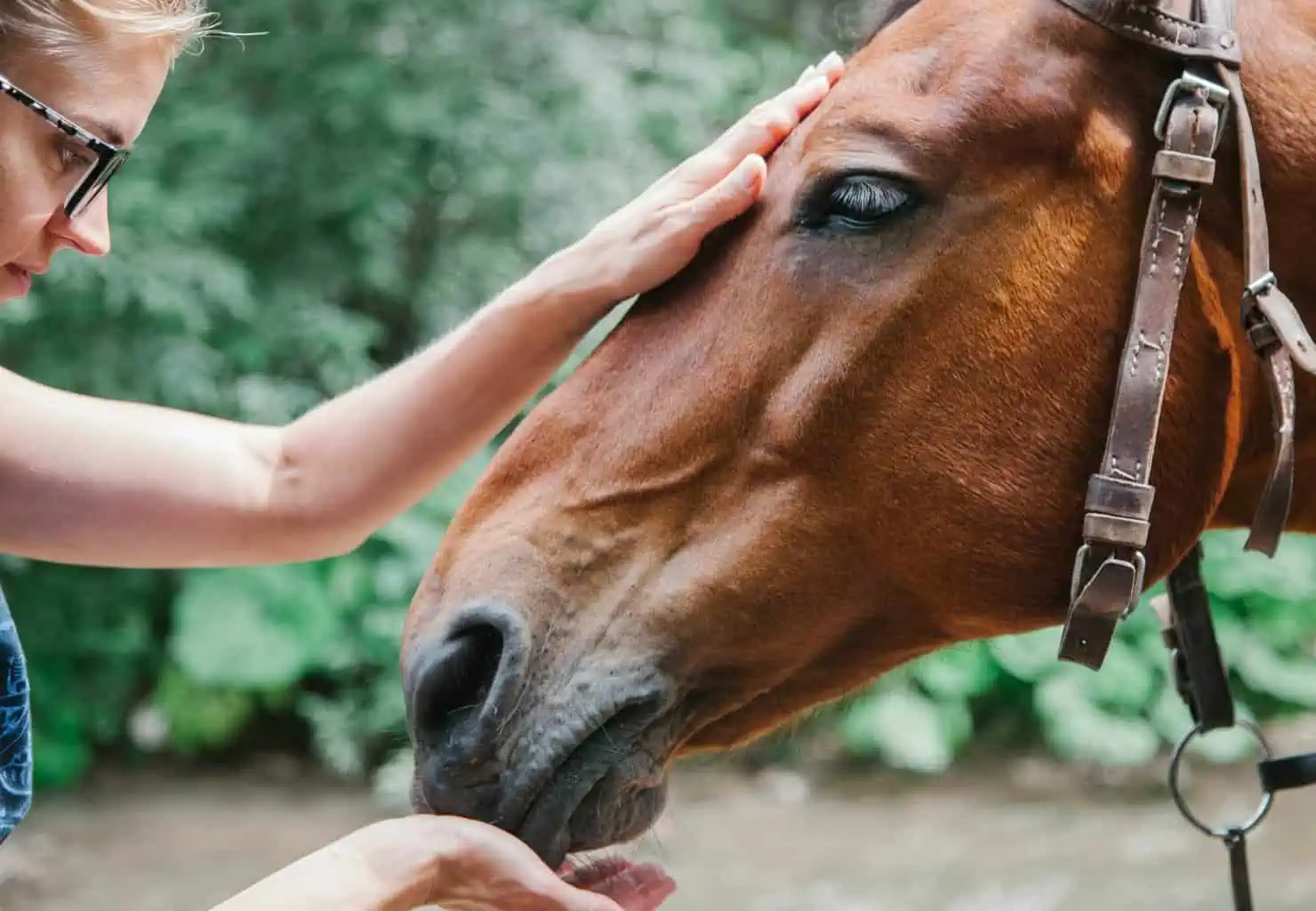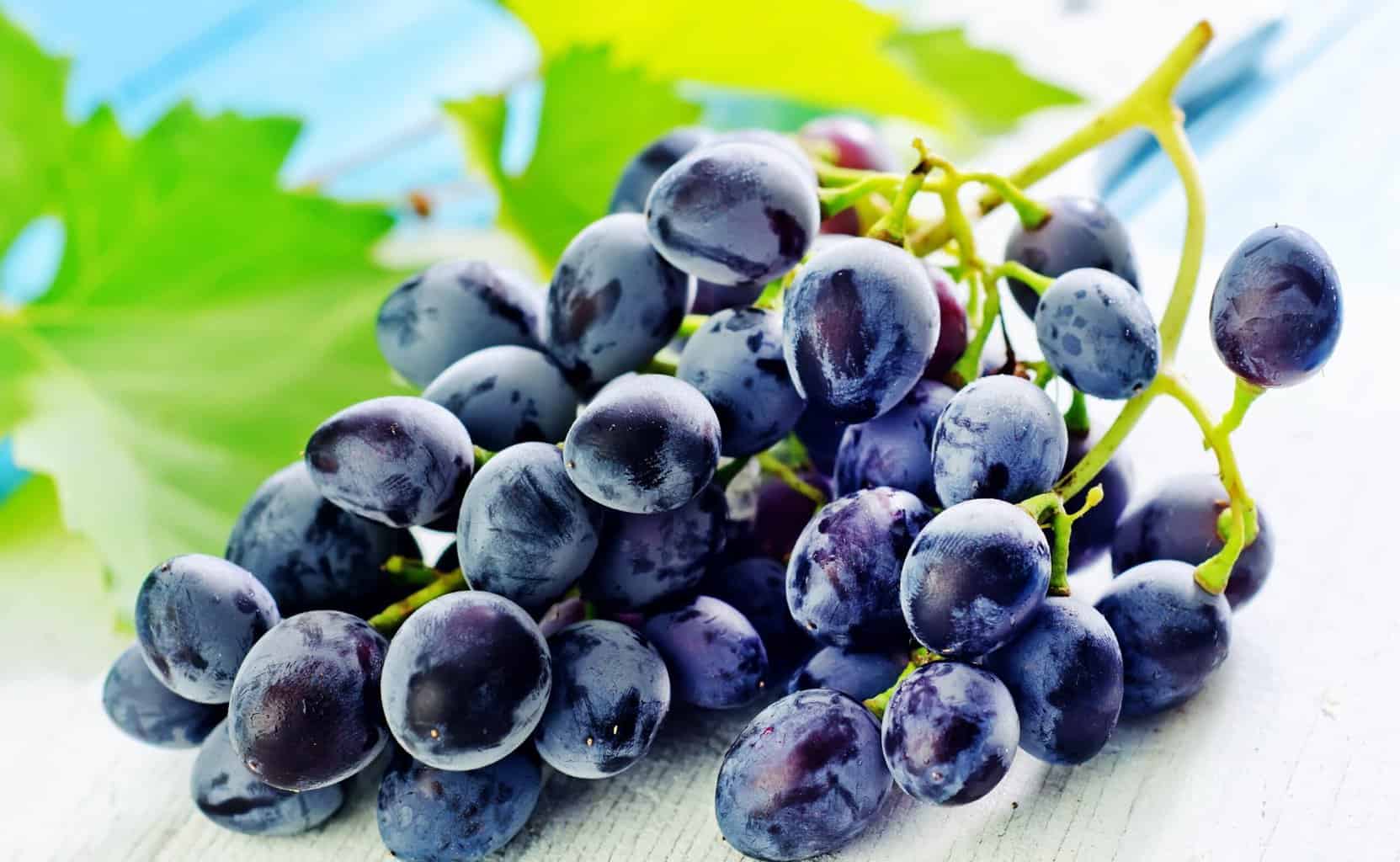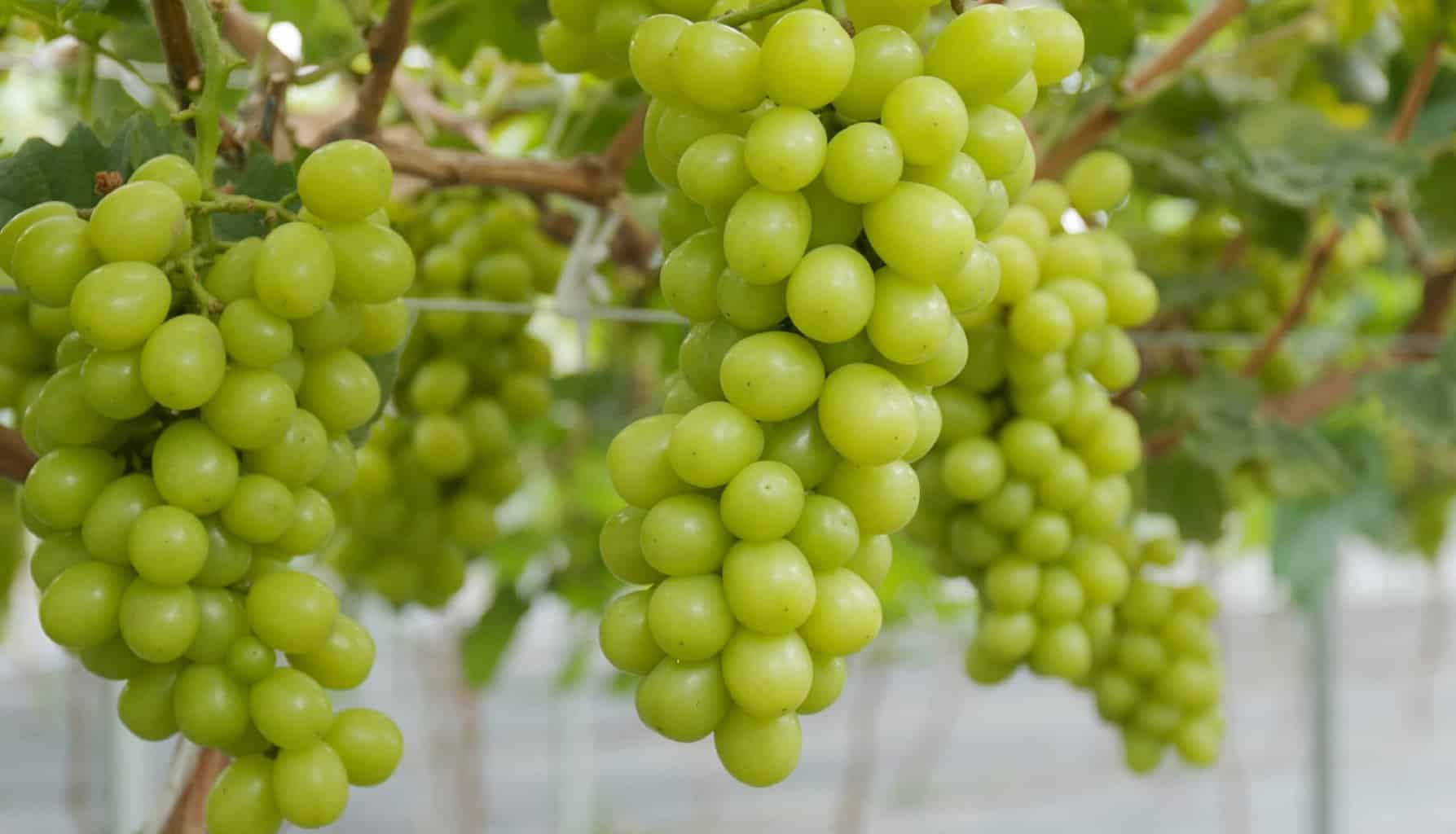- Best Horse Fly Masks Guide - October 5, 2023
- Best Horse Joint Supplements Guide - July 31, 2023
- Best Fly Sheets for Horses Guide - July 28, 2023
Horses eat more than hay, feed, and grazing. You can keep things interesting for your equine bestie by including fruit, vegetables, nuts, and seeds to ensure your horse enjoys a balanced diet. There’s no shame if you wonder whether horses can eat grapes, among other human foods.
My horse, Moonshine, loves the sweet things in life, and as I discovered this past summer, grapes are no exception.
But just how safe are grapes for horses, and should the fruit be a staple in their diet or fed in moderation?
The Answer: Should You Feed Grapes to Your Horse?
Adding grapes to your horse’s diet ensures it is varied and balanced. Grapes, young grape leaves, young vine tendrils, and raisins should be an occasional treat for your horse.
Grapes are safe for most horses. The fruit and leaves pack quite the punch in the health department. Grapes can help hydrate your horse and improve eye health and bone density.
Since grapes are high in sugar, don’t feed the fruit to horses who are obese or suffer from metabolic diseases, such as diabetes, insulin resistance, and laminitis. Steer clear when a horse has hyperkalemic periodic paralysis and liver or kidney issues.
Horses Eating Grapes: Safe or Toxic?
Horses can eat grapes since it is safe for them – as a treat or in moderation. Like us, horses also have a sweet tooth, so it’s no surprise that they love sweet, juicy grapes. Moonshine gets very excited whenever she sees that I have some grapes for her, and I get a certain amount of joy from feeding her something I know she loves. (Of course, I need to be careful to not overdo it!)
Grapes make an excellent treat because they are so effortless to feed. You don’t need to do anything special before giving your horse a bunch of grapes except for thoroughly washing the fruit and checking for signs of rot or mold (as you’d do with any other fruit or veggie).
Types and Forms of Grapes for Horses
So what kind of grapes are safest for your horse? And what about raisins (dried grapes), wine, and grape juice?
Here’s a cheat sheet so you can be sure to only give your horse the best and safest forms of grapes:
| Safe Grapes to Feed Your Horse | Do Not Feed Your Horse These Grapes |
|
|
Benefits of Eating Grapes for Horses
Grapes are very healthy, so it’s no wonder that we and our horses love these delicious treats.
Here’s the nutritional value of a cup of grapes (roughly 151 g) – though you wouldn’t feed your horse this much in one go:
| Calories: 104 kcal | Phosphorus: 30.2 mg |
| Protein: 1.09 g | Potassium: 288 mg |
| Carbohydrates: 27.3 g | Vitamin C: 4.83 mg |
| Dietary Fiber: 1.36 g | Folate (vitamin B9): 3.02 µg |
| Water: 122 g | Vitamin A: 99.7 IU |
| Calcium: 15.1 mg | Sodium: 3.02 mg |
| Iron: 0.544 mg | Magnesium: 10.6 mg |
Here are the other notable nutrients in grapes:
- Other vitamin Bs, such as vitamin B6, niacin, riboflavin, and thiamin
- Vitamin E
- Vitamin K
- Zinc
- Copper
- Manganese
- Selenium
- Fluoride
- Choline
- Alpha and beta carotene
- Lutein + zeaxanthin
The main benefits of feeding your horse grapes (in moderation) and grape leaves are:
Hydration
Grapes, like strawberries, are mostly water (82%), so you can feed your horse a few grapes to help hydrate them.
A handful of grapes won’t fully hydrate a horse that needs five to ten gallons of water daily. But you can float some grapes in your horse’s water bucket to entice them to drink more.
Or, add a grape smoothie with water, grapes, and herbs to your horse’s feed.
Improve Eye Health
The globe-like berries that we know as grapes can help improve your horse’s eye health. Grapes contain various plant compounds, such as resveratrol, that help prevent common eye diseases.
Zeaxanthin and lutein in grapes are antioxidants that improve visual performance and help maintain the health of your steed’s eyes.
Better Bone Health
Various minerals and vitamins, such as vitamins B, C, and K, manganese, and potassium, help improve bone health by preventing osteoporosis. Resveratrol also helps improve bone density.
Risks of Feeding Grapes to Horses
While grapes are a nutrient-rich powerhouse, you must know the risks of feeding grapes to your horse.
Sugar Addiction
Grapes are high in sugar, so don’t make this fruit a regular treat.
Your horse can easily develop a sweet tooth if they eat too much sweet stuff, and you surely don’t want to struggle with a horse and bad behavior when they are addicted to sweets. Feeding grapes in excess also causes obesity, dental issues, and other serious health complications.
Plus, if your horse has metabolic issues and is overweight, it’s best to feed them low-sugar treats like celery.
An Allergic Reaction
Horses have allergies, too, so your horse may be allergic to grapes. So if you are feeding grapes for the first time, take it slow and watch your horse for any adverse reactions.
A lady at the stable yard once fed her horse a couple of grapes, and the horse started sneezing within 20 minutes. Your horse may also have a skin rash, become congested, have red and watery eyes, or have trouble breathing. It’s best to call your vet since treatment for the allergy depends on the symptoms your horse has.
How Many Grapes Should a Horse Eat? And How Often?
Grapes are best fed as a treat or in moderation when part of a balanced diet.
I recommend giving your horse between 10 to 20 grapes once or twice a week. Limit the grapes to only five or six at a time if you give your horse other sweet treats during the week.
You don’t need to cut the grapes in half before feeding them to your horse, but you can.
When Should Horses Not Eat Grapes?
There are a few instances when you shouldn’t feed grapes to a horse.
Avoid giving your horse grapes to eat if they:
- Are allergic to grapes
- Are under six months of age
- Are in-foal
- Are lactating
- Are sick (unless your vet recommends feeding grapes)
- Have hyperkalemic periodic paralysis (HYPP)
- Have issues with their liver or kidneys
- Are obese
- Are diabetic
- Have insulin resistance, metabolic syndrome, or laminitis
FAQs
Answer: Never feed your horse grapes or any other food after they’ve just exercised. Your horse needs to cool down, so ensure your horse’s breathing and body temperature have returned to normal before they drink water or “bucket feed.” Small amounts of grazing after exercise while your horse cools down are okay.
Answer: Horses can drink wine, but you’ll probably end up broke if you try to get your horse drunk or addicted. However, your horse may have an allergic reaction to the preservatives in wine, and the high sugar content in wine isn’t good for your horse. So it’s best to stay clear and not give your horse a plastic glass of wine.
Answer: If grapes aren’t in season, you can feed your horse various other fruits as a treat and to show you love and adore them. Give your horse strawberries, bananas, apples, cherries, watermelon, apricots and peaches (without the stone), oranges, mangoes, cucumber, coconut, pears, and pineapple.
It’s essential to inspect the fruit for signs of mold and rot, thoroughly wash it, remove pips and stones, and cut it into bite-size pieces to prevent choke.
Conclusion
Grapes are an easy treat because you don’t need to worry about especially buying the seedless variety. And if you go riding in a vineyard or grow some grapes in your yard, your horse can safely munch on the grapes, leaves, and young vines.
Moonshine adores grapes and young grape leaves, and she particularly enjoys it when I make her a horse-friendly grape tea with crushed grapes and strawberries, rosemary, and water to slurp when it’s hot.
Are you curious about what other treats and foods are horse-friendly? Then check out my detailed guide on the best horse treats.
Read More: How Much Does a Horse Eat in a Day




